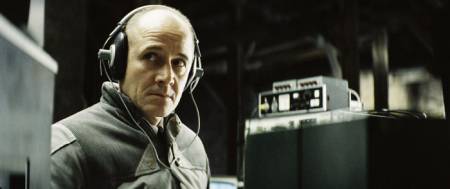Sunday Morning Talk Shows: Fire Hoses of Bullshit
Posted on February 11, 2007
I Tivo the Sunday morning talk shows and listen to them while I do my ironing on Sunday afternoon. Mostly I do this because I find ironing incredibly tedious, so anything to occupy my mind is welcome; and also because I have a reasonably high tolerance for pain.
The one thing that I come away with each week is a sense of amazement at just how distant everyone who participates — journalists and politicians alike — are from anything you or I would recognize as objective reality.
Some examples:
This morning on NBC’s Meet the Press, Republican House Leader John Boehner said of Iraq that
I believe that victory in Iraq is the only option… if we don’t—if we don’t have victory in Iraq, the consequences of failure are immense: a destabilized Iraq, a safe haven for terrorists, possible access to their oil revenue, destabilizing the greater Middle East. What happens to Israel? And if, if this isn’t bad enough, who doesn’t believe that if we withdraw and leave that chaos in the Middle East that the terrorists won’t follow us here to the United States? Victory, victory is the only option.
"Victory is the only option". Gosh, that sounds stirring! It’s like something the guy from Braveheart would say (except with a Scottish accent).
The only problem is that any reasonable observer would say that any chance we had for "victory" in Iraq is probably irretrievably lost. Things over there are so dire now that all we can do is choose which bad outcome is the least bad. The new National Intelligence Estimate on Iraq released last week says as much:
Iraqi society’s growing polarization, the persistent weakness of the security forces and the state in general, and all sides’ ready recourse to violence are collectively driving an increase in communal and insurgent violence and political extremism. Unless efforts to reverse these conditions show measurable progress during the term of this Estimate, the coming 12 to 18 months, we assess that the overall security situation will continue to deteriorate at rates comparable to the latter part of 2006.
If strengthened Iraqi Security Forces (ISF), more loyal to the government and supported by Coalition forces, are able to reduce levels of violence and establish more effective security for Iraq’s population, Iraqi leaders could have an opportunity to begin the process of political compromise necessary for longer term stability, political progress, and economic recovery.
Nevertheless, even if violence is diminished, given the current winner-take-all attitude and sectarian animosities infecting the political scene, Iraqi leaders will be hard pressed to achieve sustained political reconciliation in the time frame of this Estimate.
Put more simply, unless the Iraqi Army transforms from its current sorry state into a unified, disciplined force, we’re screwed. And the odds of that happening are about the same as the odds that it will rain chocolate milk tomorrow.
The only people more delusional than the politicians are the journalists. Later on Meet the Press, the "roundtable" of DC journos assembled to discuss the burning issues of the day. Among these was the ongoing trial of I. Lewis "Scooter" Libby — a trial at which Tim Russert, host of Meet the Press, was called to testify this week.
So what did the Enlightened Journalists think of this development? They thought it was bad for journalism:
TIM RUSSERT: Howie Kurtz, I want to ask you about the Scooter Libby trial. William Powers in the National Journal has an interesting column where he thinks that the fact that journalists have to testify is good because it will open up in terms of the public being able to see how reporters cultivate relationships to get information. You have a different view of that?
HOWARD KURTZ: Yeah, I certainly don’t think it’s a good thing at all, and I think the reputation of journalists in this Libby trial have taken a hit…The problem for us as a profession is this: When journalists get up there and testify, beside—leaving aside the First Amendment question—it looks to people like—out there like we have become too cozy with senior Bush administration officials, not so we can ferret out information about national security, not so we can find out about corruption, but, in this particular case, in some cases, acting as a conduit for White House effort to put out negative information about Joe Wilson, Valerie Plame’s husband, a big critic of the pre-war intelligence. And I think that the people out there who don’t follow this all that closely think that we have become part of the club, too much the insiders. And that is a problem for journalism.
(Emphasis mine)
So the Libby trial is a problem because it’s giving people the impression that journalists have cozied up to powerful insiders too much, choosing to just pass along whatever they’re told rather than challenge their sources and dig deeper.
I wonder why they would have gotten that impression?
Memo to Tim Russert: Dick Cheney thinks he controls you.
This delicious morsel about the "Meet the Press" host and the vice president was part of the extensive dish Cathie Martin served up yesterday when the former Cheney communications director took the stand in the perjury trial of former Cheney chief of staff I. Lewis "Scooter" Libby.
Flashed on the courtroom computer screens were her notes from 2004 about how Cheney could respond to allegations that the Bush administration had played fast and loose with evidence of Iraq’s nuclear ambitions. Option 1: "MTP-VP," she wrote, then listed the pros and cons of a vice presidential appearance on the Sunday show. Under "pro," she wrote: "control message."
In other words, Dick Cheney’s staff believes that Meet the Press is a venue where the VP can spew any bullshit he likes, secure in the knowledge that Russert won’t call him on it.
Any reasonable person, looking at the evidence coming out of the Libby trial, would think that the solution to this problem of reporters being too uncritical of their subjects would be to establish some distance between the reporters and the subjects. But the Enlightened Journalists on Meet the Press took away a different lesson. In their minds, the lesson of the Libby trial is that journalists shouldn’t have to testify in court:
RUSSERT: David Broder, Judy Miller, Matt Cooper and myself, and now Bob Woodward, Andrea Mitchell, Walter Pincus—you’re going to have a significant number of journalists going before a court, which will be all covered. What does that do to journalism?
DAVID BRODER: Well, it hurts.
Oh noes! It hurts that we might find out that they suck at their jobs. Wouldn’t we be happier, they ask, if we simply didn’t know that?
It must be nice to live on a planet where that’s considered a reasonable position.






